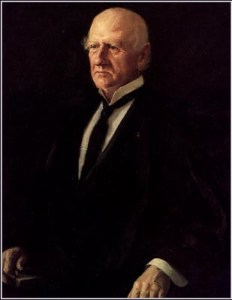In a richly detailed new article, Professors Josh Blackman (South Texas) and  Brian Frye (Kentucky), together with Michael McCloskey of the Harlan Institute for Constitutional Studies, discuss the constitutional jurisprudence of Justice John Marshall Harlan by exploring his turn-of-the-century lectures at what was then the Columbian College of Law (now GW). My old students will remember Justice Harlan for, among other opinions, his famous dissent in Plessy v. Ferguson. The paper is very interesting on many fronts, but the authors’ reconstruction of Harlan’s nationalist providentialism (Harlan himself, the authors write, was a “devout Presbyterian”) really caught my eye (particularly in light of a paper I am now working on involving a contemporary judge with not entirely dissimilar views):
Brian Frye (Kentucky), together with Michael McCloskey of the Harlan Institute for Constitutional Studies, discuss the constitutional jurisprudence of Justice John Marshall Harlan by exploring his turn-of-the-century lectures at what was then the Columbian College of Law (now GW). My old students will remember Justice Harlan for, among other opinions, his famous dissent in Plessy v. Ferguson. The paper is very interesting on many fronts, but the authors’ reconstruction of Harlan’s nationalist providentialism (Harlan himself, the authors write, was a “devout Presbyterian”) really caught my eye (particularly in light of a paper I am now working on involving a contemporary judge with not entirely dissimilar views):
In his lectures, Justice Harlan expressed a strong belief in American exceptionalism and in the role of providence in America’s success. He saw a tight connection between the rule of law and religion, and considered them both essential to America’s prosperity. For Harlan, constitutional liberty consisted of the common law rights of Englishmen, secured by the Constitution and realized by the Court. The primary merit of a written Constitution was to render immutable traditional common law rights. And those common law rights were secured and realized only by special providences, indelibly marked by blood and fire. Harlan argued that the Fourteenth Amendment incorporated the Bill of Rights against the states. He believed that the Constitution expressed the “providential” purpose of the United States. Discussing the clause that requires that officers must swear to uphold the Constitution, Harlan asks, “Is there any country on the Earth that has in its statutes or laws a provision like that? Not one.” ….
Harlan’s republicanism committed him to popular sovereignty, civic virtue, and self-governance. Other Justices saw the rights guaranteed by the Constitution as abstract, derived from reason and practicality. For some, like Holmes and Brandeis, it meant legal realism. By contrast, Harlan saw constitutional rights as elements of a shared culture, and the extension of them to the states through the Constitution as a means of promoting and preserving national unity. By affirming a common American heritage, rooted in “Anglo-Saxon” liberties, the Court, through the Bill of Rights and the constitutional privileges and immunities it protected, could help create a unified nation, one with the ideological strength to overcome sectional and racial differences. Harlan’s lectures were one tool for accomplishing this goal.
 Word comes that sociologist Robert Bellah (left) has passed away at the age of 86. Bellah was famous for his work on American civil religion–indeed, he reintroduced that concept to American law in the 1960s–and the magisterial Habits of the Heart, a book he co-authored in 1985. Habits remains remarkably relevant today, particularly in its famous discussion of “Sheilaism,” the thoroughly individualist spirituality that appeals to so many Americans, particularly the growing number of “Nones.” When he died, he was working on a new book, Religion in Human Evolution. Matt Schmitz has
Word comes that sociologist Robert Bellah (left) has passed away at the age of 86. Bellah was famous for his work on American civil religion–indeed, he reintroduced that concept to American law in the 1960s–and the magisterial Habits of the Heart, a book he co-authored in 1985. Habits remains remarkably relevant today, particularly in its famous discussion of “Sheilaism,” the thoroughly individualist spirituality that appeals to so many Americans, particularly the growing number of “Nones.” When he died, he was working on a new book, Religion in Human Evolution. Matt Schmitz has  Mark and I are pleased to welcome
Mark and I are pleased to welcome 

 Politics of Market Islam in Turkey and the World
Politics of Market Islam in Turkey and the World Indonesia
Indonesia Rodney Stark’s most recent book,
Rodney Stark’s most recent book,